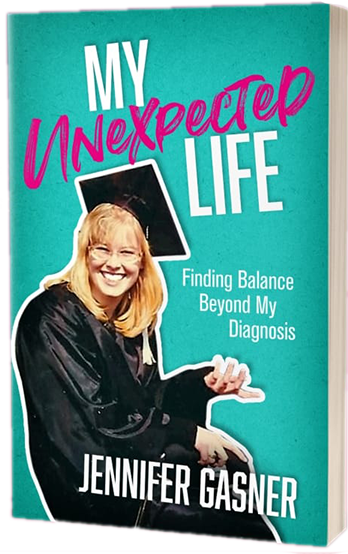I was 17 when the Americans with Disabilities Act, (ADA), was signed by President George H. W. Bush in July 1990.
While I don’t remember the specific words, images of me standing in our summer sun-lit living room pausing to enjoy the cool breeze coming from the air-conditioning remain. With my eyes closed, I heard the voice of ABC’s World News Tonight. Pots and pans cluttered on the other side of the wall, signaling the preparation of dinner. Peter Jennings, in his perfect news anchor voice, told of the signing of the ADA. When I heard the word disabilities, my eyes popped open to find the TV. Although my concrete diagnosis, (Friedreich’s ataxia), had yet to be made, my year-long search for answers about my lack of balance, led me to believe I was a disabled American.
I saw President Bush sitting at a wooden desk, flanked by two wheelchair users and two others standing behind the Commander in Chief. It looked like a crisp day with blue skies and sun in D.C.
While I saw myself, I didn’t consider the millions of disabled people living in a world pre-ADA. I had disabled classmates. They were integrated into our school. I never thoughts they would have problems accessing buildings or getting jobs or feeling isolated.
It took me 10 years to figure it out, but they and other disabled people more than likely did experience a greater lack of resources and respect.
Thirty-two years later, my appreciation of the ADA and those who fought for it has grown. I’ve watched the documentary Crip Camp on Netflix. The film features a rare camp for people with disabilities in the 1970s. Disabled people came to this camp during summers in New York state. Just like any camp, there were late nights, romance, and even an outbreak of crabs. Being the ’70’s counselors would be more than happy to smoke pot with campers.
More than creating fun, Crip Camp was a place a community was formed. Many of the campers became lifelong friends and some participated in a 28-day non-violent sit-in at a federal building in San Francisco to get Section 504 of the Rehabilitation Act of 1973 enforced. 504 prohibited discrimination of people with disabilities at any place that got federal money.
After four years of the government basically ignoring Section 504 and the sit-in by mostly disabled activists, the regulations were signed. Those guidelines became the foundation for the ADA.
Judy Heuman, one of the campers in the documentary, played a major leadership role in the protest. Her memoir, Being Human, is about growing up in the ’50s as a wheelchair user and the historical fight for the 504. Her book came out around the same time as the documentary.
It details the issues of discrimination she faced and that almost nobody considered wrong at the time. She couldn’t go to school for years because she was considered a fire hazard. When she did go, her class was separate from the general population. Accessible transportation was hard to find.
No doubt there is still much work to be done–these laws didn’t make discrimination non-existent. I went to college and got accommodations for note-taking and tests due to my slow and difficult writing. Most of the time, no one argued but a few did and told me they did not take the ADA seriously. Really? I also found full-time employment though out of the seven employers I had, I feel like only one presented me with tasks that matched my level of education and brain power. (The other six involved too much data entry.)
In the beginning of the Covid-19 pandemic, I stayed at home, avoided public transportation, etc. I had a window into how limiting life for disabled people could be–no going beyond your house or taking the bus, etc. But that time was a tiny portion of my life. I wonder, do I really understand? Regardless, I am thankful to the countless numbers of disability advocates who made the quality of my life possible—I had an education, I worked, there are curb cuts, ramps on busses, trains, and so much more.
Now July is Disability Pride Month—let’s celebrate our past victories and thank those who came before!
My next post will be about why I AM DISABLED AND PROUD.
Until the next…


Crip Camp is an eye opening film. I learned so much from it. Love your writing!
People love to discriminate – give them almost any reason that does NOT apply to them, and they’re happy to have someone ‘lesser’ to feel superior to.
ADA is often honored more in the breach than in the observance – I should NOT have to ask nicely to get my mobility device to travel with me in the ONBOARD WHEELCHAIR CLOSET – instead, they should make its existence, its size limits, and its availability VERY clear to disabled people who need one to move around.
It’s not like we’re suddenly going to be traveling a lot more knowing this – travel is still physically and mentally harder for disabled folk.
It’s just that the crew doesn’t like to remove its luggage from the convenient little closet by the door.
I shouldn’t have to KNOW my rights, BE polite and nice, and INSIST. CALL ahead. CHECK and RECHECK. Get there EARLY. BE prepared to have you mobility device challenged, and your limited store of energy drained…
They should be asking, “How can we make your travel more possible?” As if I were someone they wanted to impress, not someone who will make their life harder for no good reason.